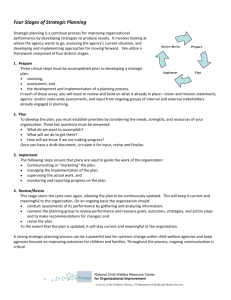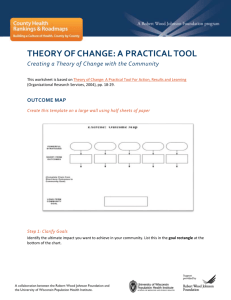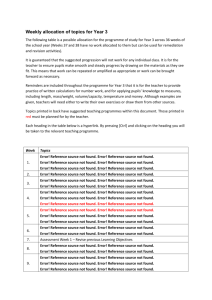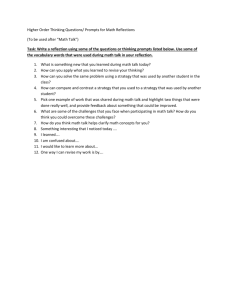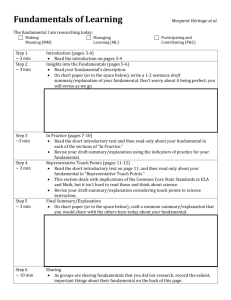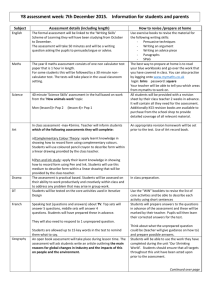EDEXCEL GCSE Additional Science Revision Planner 2013-2014
advertisement
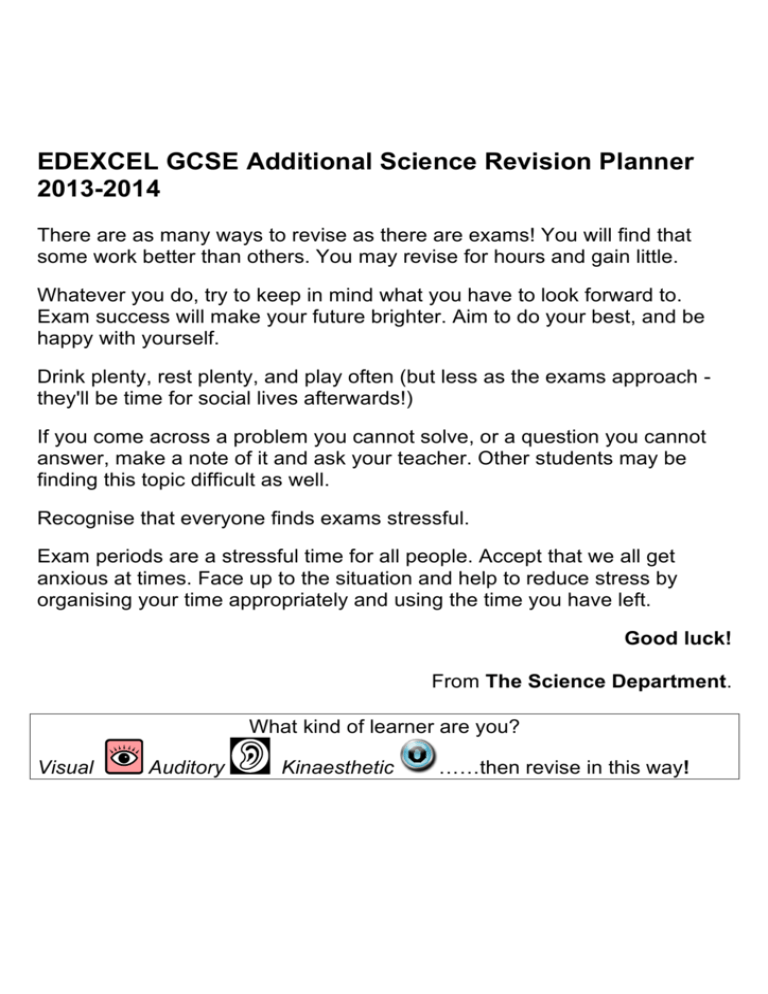
EDEXCEL GCSE Additional Science Revision Planner 2013-2014 There are as many ways to revise as there are exams! You will find that some work better than others. You may revise for hours and gain little. Whatever you do, try to keep in mind what you have to look forward to. Exam success will make your future brighter. Aim to do your best, and be happy with yourself. Drink plenty, rest plenty, and play often (but less as the exams approach they'll be time for social lives afterwards!) If you come across a problem you cannot solve, or a question you cannot answer, make a note of it and ask your teacher. Other students may be finding this topic difficult as well. Recognise that everyone finds exams stressful. Exam periods are a stressful time for all people. Accept that we all get anxious at times. Face up to the situation and help to reduce stress by organising your time appropriately and using the time you have left. Good luck! From The Science Department. What kind of learner are you? Visual Auditory Kinaesthetic ……then revise in this way! Revising What? How you revise is most important. Some don'ts: • • • don't just read your specification, books or class notes, or revision guides don't just work through questions don't forget to take a break! Revising will always get tedious. Remember: Nothing easy is worthwhile and nothing worthwhile is easy. So, fire yourself up and do: • • • • • • • • • use lots of ways to revise plan your revision with a timetable read, and write summaries of, your notes draw diagrams sketch mind maps (spider diagrams) of key issues use mnemonics (rhymes of word lists) to prompt you revise with a friend: ask and answer questions work through past exam papers answer guided questions in revision books Revising Where? Try to find somewhere where you won't be disturbed. If you can work with music on, this can help you relax. It can also drown at noises around you. Make sure you have an empty desk to work at, with everything you need at hand for the session ahead. Have plenty of scrap paper handy. If you're using the web to revise, make sure you know what you want to improve on before you start. Revising When? You can never revise enough might be true, but don't sit for hours on end working at the same subject—your revision will be most effective in the first hour. So make sure you: • • • plan revision slots of between 15 - 30 minutes have something to look forward to, e.g. a TV show tick off things that you have done, and note things you have to do Note-taking strategies to help you revise Highlight the sentences that pick out the main points. Highlight different types of information in different colours. Delete sentences that repeat ideas. List related bullet points. List similarities and differences. Cross out words that are not needed and highlight those that are. Link the important words together in an interesting way. Use spider diagrams, tree diagrams or other graphic organisers. Write own explanations for key words after reading a text. Write five key words to sum up content of the text. Change text into a labelled diagram. Pick main points out of a text and write each on a separate card. Sort the cards into more or less important points. Change text into a flow chart. Create a revision map http://www.bbc.co.uk/schools/gcsebitesize/maps/index.shtml Did you know you could revise using science podcasts? http://www.gcsepod.co.uk/home/ http://www.bbc.co.uk/schools/gcsebitesize/audio/science/ Useful websites http://www.bbc.co.uk/schools/gcsebitesize/science/aqa/ Biology http://www.abpischools.org.uk/page/resource/age.cfm Chemistry http://www.gcsescience.com/science-chemistry-revision.htm Physics http://www.cyberphysics.co.uk/key_stage/KS4.htm http://www.gcsescience.com/science-physics-revision.htm Others will be given to you during the year!!! Make sure you use them!!! Biology B2 Building blocks of Cells • Plant and Animal Cells • Bacteria • DNA • Genetic engineering • Mitosis and Meiosis • Cloning • Protein synthesis • Mutations • Enzymes Organisms and energy • Aerobic and anaerobic respiration • Photosynthesis • Water transport • Organisms and the environment Common Systems • Fossils and evolution • Blood • Heart • Circulatory system • Digestion and digestive system Chemistry C2 Atomic Structure and the periodic table • The early periodic table • The modern periodic table • Trends within the periodic table Ionic compounds and analysis • Ionic bonding • Solubility • Precipitates • Ion test Covalent compounds and separation techniques • Covalent bonding • Structure properties and uses • Miscible and immiscible • Chromatography Groups in the periodic table • Metallic bonding • Alkali metals • Halogens • Displacement reactions • Noble gases Chemical reactions • Exothermic and endothermic reactions • Rates of reaction • Collision theory • Catalysts Quantitative chemistry • Chemical Calculations Physics P2 Forces and their effects • Resultant forces • Forces and motion • Forces and braking • Forces and terminal velocity • Acceleration • Graphs • Forces and energy • Momentum • Work and Power Electricity • Static electricity • Current and voltage in electrical circuits • Resistance Nuclear Fission and Fusion • Isotopes • Ionising radiation • Nuclear reactions • Nuclear power • Half life • Uses of radiation 17/2 18/2 P2 static electricity 24/2 19/2 B2 cells 25/2 26/2 B2 DNA 3/3 5/3 P2 review all of the forces 10/3 11/3 C2; Ionic bonding and Ions 12/3 17/3 C2: Covalent bonding 18/3 19/3 25/3 P2 review of nuclear fission and fusion 26/3 P2: Momentum 1/4 27/2 28/2 6/3 C2: Miscible and immiscible Chromotography B2 cell division. 1/3 7/3 8/3 B2: Cloning 13/3 20/3 3/4 2/3 9/3 P2 Graphs 14/3 15/3 16/3 21/3 B2 transport systems in plants 22/3 23/3 B2: Enzymes 27/3 23/2 B2 genetic engineering 28/3 P2: Resistance 2/4 22/2 P2 Current and voltage in circuits P2 Acceleration B2: Photosynthesis 31/3 21/2 C2 period table 4/3 C2: Properties of structures and identification tests 24/3 20/2 C2: Groups in the periodic table 29/3 30/3 B2: Aerobic and anaerobic respiration 4/4 B2: Water transport 5/4 6/4 P2: Braking and stopping distance Easter Holidays - it’s up to you – how much and how often you revise in your holidays; catch up on work you are behind on, revise areas your weakest at, just keep going; it’s almost over. 21/4 22/4 B2 - review all of your DNA and inheritance 28/4 23/4 P2 atoms and radiation; nuclear fission and fusion 29/4 30/4 C2: Rates of reaction 5/5 6/5 B2: Digestions 12/5 Review All Biology B2 19/5 24/4 25/4 C2:Exo and endothermic reactions 1/5 2/5 P2: Work and Power 7/5 8/5 P2: Half life 13/5 14/5 20/5 Revise All Chemistry C2 21/5 Revise All Biology B2 26/4 27/4 B2: Blood 3/5 4/5 B2: Heart 9/5 10/4 C2: chemical calculations 15/5 16/5 22/5 Review all Physics P2 23/5 Revise All Physics P2 11/5 Review all Physics P2 17/5 18/5 24/5 Review all Physics P2 25/5 Review all Chemistry C2 May half term - it’s up to you – how much and how often you revise in your holidays; catch up on work you are behind on, revise areas your weakest at, just keep going; it’s almost over. 2/6 3/6 9/6 Revise All Physics P2 10/6 Review all Chemistry C2 C2 exam 4/6 5/6 6/6 7/6 B2 exam Review all Chemistry C2 11/6 Revise All Biology B2 12/6 Revise All Physics P2 8/6 P2 exam Celebrate – you have finished!!! Your grade should reflect how much effort you have put in – remember, help is available: During lessons; just ask when you’re stuck! Lunch times: Monday, Wednesday and Thursday Week A Monday, Wednesday and Friday Week B Every Wednesday after school There are Saturday sessions available; dates are on the main school calendar GOOD LUCK AND BEST WISHES ☺
